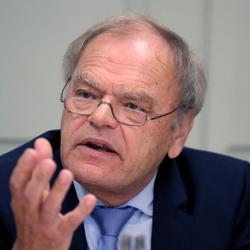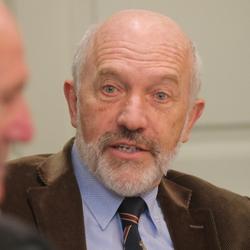Jean Blondel, a remarkable academic and a founding father of ECPR, passed away peacefully on 25 December 2022. Ferdinand Müller-Rommel and Maurizio Cotta look back on his extraordinary life and career in a touching tribute to the highly esteemed scholar, tireless mentor and generous friend.
Career beginnings
Jean Blondel was born in Toulon on 26 October 1929. His academic interest in political science emerged in 1950 during his studies at the Institute d’études politiques de Paris (also known as Sciences Po) where his thinking was heavily influenced by Maurice Duverger’s seminal comparative book on political parties (first published in French in 1950).
As an undergraduate. he received a one-year student fellowship in Brazil. After completing his thesis on the local political parties in the state of Paraiba, he spent three years in Britain. This resulted in a graduate degree at St Antony’s College Oxford and a further research student fellowship at the University of Manchester (1957–58). While Jean had originally intended to become a teacher in France, he accepted his first job offer, aged 29, as an assistant lecturer to Samuel Finer at Keele University.
Institution building
Four years later two new opportunities appeared almost simultaneously. One was an award by the American Council of Learned Societies to spend a year at Yale studying with Robert Dahl, Robert Lane, Karl Deutsch, David Barber et al. The other was an offer to become Professor of Government at the newly established University of Essex. Jean accepted both positions. He first spent a year at Yale and returned to Britain in 1964, where he founded the Department of Government at the University of Essex. Together with his colleagues, over the next twenty years, he established several new MA programmes, the Essex Summer School in Social Science Data Analysis, as well as the European Consortium for Political Research.
Jean Blondel was both a world-renowned scholar in comparative politics and a talented institution builder of European political science.
After his retirement from Essex in 1984, he spent one year as a research scholar at the Russell Sage Foundation in New York before accepting an offer as Professor of Comparative Politics at the European University Institute in Florence, a position he held until 1994. Since then, he has been Emeritus Professor at the Robert Schuman Center for Advanced Studies (EUI) and a visiting Professor in residence at the University of Siena where he helped establish an innovative PhD programme in comparative politics.
Publications
A complete list of Jean's publications is not yet available. However, over the past 60 years he has published at least 29 books and more than a hundred articles. His most influential and widely recognised monographs include Voters, Parties, Leaders (1963), Comparative Government: An Introduction (1969), Comparative Legislatures (1973), Political Leadership (1987), The Presidential Republic (2015) and his trilogy on world governments (with SAGE Publications): World Leaders (1980), The Organization of Governments (1982); Government Ministers in the Contemporary World (1985).
In these and his other publications, Jean Blondel has indefatigably called attention to the value of classification and comparison in the study of politics.
He was utterly convinced of the importance of the systematic collection of empirical findings in the area of comparative government, and kept telling everybody that the state of social science knowledge was centuries away from that of the hard sciences – and for that reason, we should keep on working!
Tributes and accolades
A track record such as this does not pass without academic tributes and accolades. Jean held honorary doctorates from the universities of Salford and Essex in the United Kingdom, Louvain-La-Neuve in Belgium, Turku in Finland, Macerata and Siena in Italy.
He also received lifetime achievement awards from the British Political Science Association (PSA) as well as the ECPR. Moreover, the University of Uppsala has honoured Jean Blondel with the Johan Skytte Prize – popularly known as the Nobel Prize for political science – for his ‘outstanding contribution to the professionalisation of European political science, both as a pioneering comparativist and an institution builder’. In addition to these honours, Jean was an elected member of the Royal Swedish Academy of Science, the American Academy of Arts and Sciences and the Academia Europaea.
Jean Blondel was never ‘talkative’ about these merits, mainly because he never took himself too seriously. The story is that, after having received awards and other honours he used to say ‘I do not think that I have deserved this’. He was known to be modest, kind and down to earth.
A hallmark characteristic of Jean’s personality was his French charm which was always warm and friendly, cheerful and joyful.
He was a tireless mentor of all generations, particularly to young researchers, for whom he always asked for more coherent MA and PhD programmes. According to him, courses in a graduate programme should not just contribute to the preparation of the thesis or the dissertation, but towards research for a lifetime.
Lifelong dedication to the discipline
Jean Blondel was also one of the few people who could look back on 60 years of being an active professor in political science. Many colleagues stop working after they leave university. Jean's dedication to political science, however, was lifelong. Retirement from work was an inconceivable concept for him. He never retired from political science and published his last book three years ago, at the age of 90.
With his creative ideas, his unrelenting activity and his great integrity, he promoted the quality of European political science research and teaching.
After Jean Blondel's passing, we remember a highly esteemed scholar, one who opened new fields of research, who promoted enduring academic institutions, who was the mentor of so many younger scholars, but first of all, a man of honesty and manifest integrity, as well as a generous friend. Political science lost a gifted institution-builder, a highly esteemed scholar and an extraordinary human being.

Ferdinand Müller-Rommel
Leuphana University

Maurizio Cotta
University of Siena